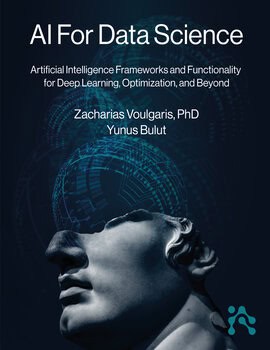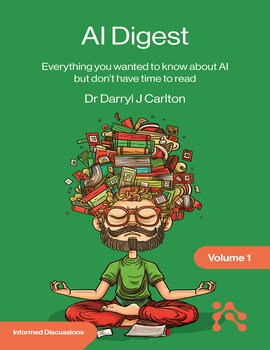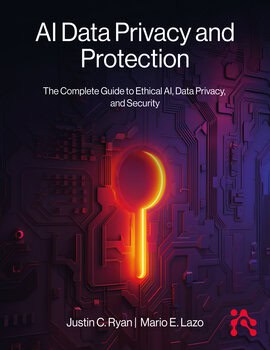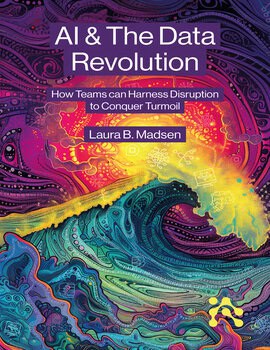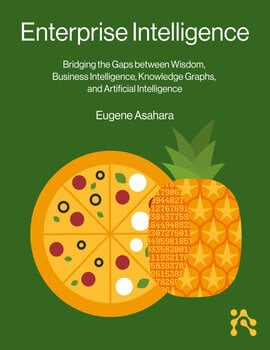AI for Data Science
AI for Data Science: Artificial Intelligence Frameworks and Functionality for Deep Learning, Optimization, and Beyond, by Dr. Zacharias Voulgaris and Yunus Emrah Bulut
Master the approaches and principles of Artificial Intelligence (AI) algorithms, and apply them to Data Science projects with Python and Julia code.
Topics
Chapter 1: Deep Learning Frameworks
About deep learning systems
How deep learning systems work
Main deep learning frameworks
Main deep learning programming languages
How to leverage deep learning frameworks
Deep learning methodologies and applications
Assessing a deep learning framework
Summary
Chapter 2: AI Methodologies Beyond Deep Learning
Optimization
Fuzzy inference systems
Artificial creativity
Additional AI methodologies
Glimpse into the future
About the methods
Summary
Chapter 3: Building a DL Network Using MXNet
Core components
MXNet in action
MXNet tips
Summary
Chapter 4: Building a DL Network Using TensorFlow
TensorFlow architecture
Core components
TensorFlow in action
Visualization in TensorFlow: TensorBoard
High level APIs in TensorFlow: Estimators
Summary
Chapter 5: Building a DL Network Using Keras
Core components
Keras in action
Model Summary and Visualization
Converting Keras models to TensorFlow Estimators
Summary
Chapter 6: Building an Optimizer Based on the PSO Algorithm
PSO algorithm
Main PSO variants
PSO versus other optimization methods
PSO implementation in Julia
PSO in action
PSO tips
Summary
Chapter 7: Building an Optimizer Based on Genetic Algorithms
Standard Genetic Algorithm
Implementation of GAs in Julia
GAs in action
Main variants of GAs
GA framework tips
Summary
Chapter 8: Building an Optimizer Based on Simulated Annealing
Pseudo-code of the Standard Simulated Annealing Algorithm
Implementation of Simulated Annealing in Julia
Simulated Annealing in action
Main Variants of Simulated Annealing
Simulated Annealing Optimizer tips
Summary
Chapter 9: Building an Advanced Deep Learning System
Convolutional Neural Networks (CNNs)
Recurrent Neural Networks
Summary
Chapter 10: Building an Optimization Ensemble
The role of parallelization in optimization ensembles
Framework of a basic optimization ensemble
Case study with PSO Systems in an ensemble
Case study with PSO and Firefly ensemble
How optimization ensembles fit into the data science pipeline
Ensemble tips
Summary
Chapter 11: Alternative AI Frameworks in Data Science
Extreme Learning Machines (ELMs)
Capsule Networks (CapsNets)
Fuzzy logic and fuzzy inference systems
Summary
Chapter 12: Next Steps
Big data
Specializations in data science
Publicly available datasets
Summary
Aspiring and practicing Data Science and AI professionals, along with Python and Julia programmers, will practice numerous AI algorithms and develop a more holistic understanding of the field of AI, and will learn when to use each framework to tackle projects in our increasingly complex world.
The first two chapters introduce the field, with Chapter 1 surveying Deep Learning models and Chapter 2 providing an overview of algorithms beyond Deep Learning, including Optimization, Fuzzy Logic, and Artificial Creativity.
The next chapters focus on AI frameworks; they contain data and Python and Julia code in a provided Docker, so you can practice. Chapter 3 covers Apache’s MXNet, Chapter 4 covers TensorFlow, and Chapter 5 investigates Keras. After covering these Deep Learning frameworks, we explore a series of optimization frameworks, with Chapter 6 covering Particle Swarm Optimization (PSO), Chapter 7 on Genetic Algorithms (GAs), and Chapter 8 discussing Simulated Annealing (SA).
Chapter 9 begins our exploration of advanced AI methods, by covering Convolutional Neural Networks (CNNs) and Recurrent Neural Networks (RNNs). Chapter 10 discusses optimization ensembles and how they can add value to the Data Science pipeline.
Chapter 11 contains several alternative AI frameworks including Extreme Learning Machines (ELMs), Capsule Networks (CapsNets), and Fuzzy Inference Systems (FIS).
Chapter 12 covers other considerations complementary to the AI topics covered, including Big Data concepts, Data Science specialization areas, and useful data resources to experiment on.
A comprehensive glossary is included, as well as a series of appendices covering Transfer Learning, Reinforcement Learning, Autoencoder Systems, and Generative Adversarial Networks. There is also an appendix on the business aspects of AI in data science projects, and an appendix on how to use the Docker image to access the book’s data and code.
The field of AI is vast, and can be overwhelming for the newcomer to approach. This book will arm you with a solid understanding of the field, plus inspire you to explore further.
About Zack
Dr. Zacharias Voulgaris was born in Athens, Greece. He studied Production Engineering and Management at the Technical University of Crete, shifted to Computer Science through a Masters in Information Systems & Technology, and then to Data Science through a PhD in Machine Learning. He has worked at Georgia Tech as a Research Fellow, at an e-marketing startup in Cyprus as an SEO manager, and as a Data Scientist in both Elavon (GA) and G2 Web Services (WA). He also was a Program Manager at Microsoft on a data analytics pipeline for Bing. Zacharias has authored several books on Data Science, mentors aspiring data scientists, and maintains a Data Science and AI blog. Currently, he works as a consultant at GLG.
About Yunus
Yunus Emrah Bulut was born in Amasya, Turkey. After he studied Computer Science in Bilkent University, he has worked as a computer scientist at several corporations including Turkey’s biggest telecom operator and the Central Bank of Turkey. After he completed his Master of Science degree at the Economics department of the Middle East Technical University (METU), he worked several years in the research department of the Central Bank of Turkey as a research economist. More recently, he has started to work as a Data Science consultant for companies in Turkey and USA. He is also a Data Science instructor at Datajarlabs and Data Science mentor in Thinkful.
Faculty may request complimentary digital desk copies
Please complete all fields.
